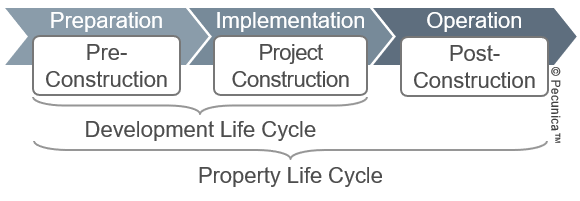The property life cycle covers the entire life cycle of a property, from its concept until the end of its economic useful life:
- Pre-construction – Conceptual planning, feasibility studies, operator selection, and securing site entitlements;
- Project construction – Developer execution of the development strategy and the contracting the professional services and consultants for project implementation and realization; and
- Post-construction – Operation and maintenance of the built property upon construction completion, commonly marking the developer's exit from the project.
The hotel project life cycle is the period of time and the phases of a hotel development project, from its original idea through the operation of the hotel business and ultimate property disposition. It defines the interrelated project development phases and final delivery of the built facilities to its operator and asset manager.


Alternatively, the life cycle of a hotel development project can be distinguished in more granular and sequential phases that parallel the project value chain. The value chain follows a property's life cycle and describes the activities in the production process that are needed to deliver a product and the points in the process where value is created for the developer and project investors.
To perform the various activities during the property's extended life cycle, the roles and responsibilities are assumed or assigned by the developer to the different project participants in each phase of the development project. The appropriate level of integration depends on the respective participant's position and function in the development process.
Project sustainability is advantageous for all stakeholders throughout the hotel project life cycle. Benefit and profit are realized through utility savings, meeting consumer preferences, and complying with ESG targets, standards and regulations.

